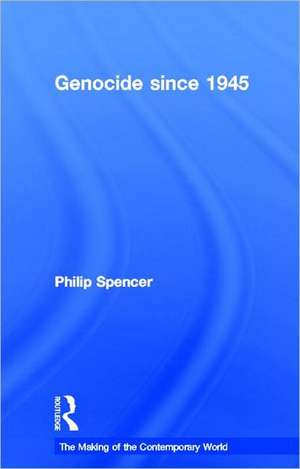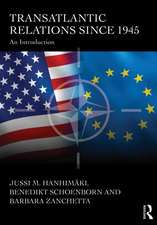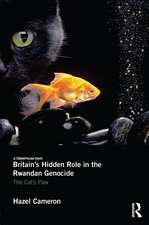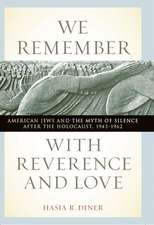Genocide since 1945: The Making of the Contemporary World
Autor Philip Spenceren Limba Engleză Hardback – 15 iun 2012
Tracing the history of genocide since 1945, and looking at a number of cases across continents and decades, this book discusses a range of critical and inter-connected issues such as:
- why this crime is different, why exactly it is said to be "the crime of crimes"
- how each genocide involves a deadly triangle of perpetrators (with their collaborators), victims and bystanders as well as rescuers
- the different stages that genocides go through, from conception to denial
- the different explanations that have been put forward for why genocide takes place
- and the question of humanitarian intervention.
| Toate formatele și edițiile | Preț | Express |
|---|---|---|
| Paperback (1) | 340.60 lei 6-8 săpt. | |
| Taylor & Francis – 15 iun 2012 | 340.60 lei 6-8 săpt. | |
| Hardback (1) | 996.83 lei 6-8 săpt. | |
| Taylor & Francis – 15 iun 2012 | 996.83 lei 6-8 săpt. |
Din seria The Making of the Contemporary World
-
 Preț: 286.09 lei
Preț: 286.09 lei -
 Preț: 286.98 lei
Preț: 286.98 lei -
 Preț: 283.67 lei
Preț: 283.67 lei -
 Preț: 278.64 lei
Preț: 278.64 lei -
 Preț: 381.21 lei
Preț: 381.21 lei -
 Preț: 228.41 lei
Preț: 228.41 lei - 18%
 Preț: 993.97 lei
Preț: 993.97 lei -
 Preț: 352.51 lei
Preț: 352.51 lei - 18%
 Preț: 996.65 lei
Preț: 996.65 lei -
 Preț: 341.16 lei
Preț: 341.16 lei -
 Preț: 337.50 lei
Preț: 337.50 lei - 17%
 Preț: 236.54 lei
Preț: 236.54 lei -
 Preț: 349.10 lei
Preț: 349.10 lei -
 Preț: 344.90 lei
Preț: 344.90 lei -
 Preț: 343.94 lei
Preț: 343.94 lei -
 Preț: 380.07 lei
Preț: 380.07 lei -
 Preț: 342.13 lei
Preț: 342.13 lei -
 Preț: 292.26 lei
Preț: 292.26 lei -
 Preț: 357.13 lei
Preț: 357.13 lei -
 Preț: 344.90 lei
Preț: 344.90 lei -
 Preț: 338.26 lei
Preț: 338.26 lei - 18%
 Preț: 1000.27 lei
Preț: 1000.27 lei -
 Preț: 337.33 lei
Preț: 337.33 lei -
 Preț: 347.25 lei
Preț: 347.25 lei -
 Preț: 342.47 lei
Preț: 342.47 lei -
 Preț: 338.24 lei
Preț: 338.24 lei - 31%
 Preț: 761.34 lei
Preț: 761.34 lei
Preț: 996.83 lei
Preț vechi: 1215.65 lei
-18% Nou
Puncte Express: 1495
Preț estimativ în valută:
190.74€ • 199.15$ • 157.86£
190.74€ • 199.15$ • 157.86£
Carte tipărită la comandă
Livrare economică 05-19 aprilie
Preluare comenzi: 021 569.72.76
Specificații
ISBN-13: 9780415606332
ISBN-10: 0415606330
Pagini: 176
Ilustrații: 8
Dimensiuni: 138 x 216 x 11 mm
Greutate: 0.35 kg
Ediția:1
Editura: Taylor & Francis
Colecția Routledge
Seria The Making of the Contemporary World
Locul publicării:Oxford, United Kingdom
ISBN-10: 0415606330
Pagini: 176
Ilustrații: 8
Dimensiuni: 138 x 216 x 11 mm
Greutate: 0.35 kg
Ediția:1
Editura: Taylor & Francis
Colecția Routledge
Seria The Making of the Contemporary World
Locul publicării:Oxford, United Kingdom
Public țintă
General and UndergraduateCuprins
Acknowledgements. Introduction 1. Never Again? From the Holocaust to the Genocide Convention 2. The Genocide Convention 3. Explaining Genocide 4. Perpetrators, Bystanders, Victims and Rescuers 5. Genocide During the Cold War 6. Genocide After the Cold War 7. Genocide and Humanitarian Intervention 8. The Genocide Convention. Conclusion: The Politics of Genocide Today. Appendix. Glossary
Recenzii
"An admirable introduction to the 'crime of crimes' since 1945, tackling the key issues and debates surrounding the problem of genocide, wide-ranging, incisive, engagingly argued, and deeply informed by case studies and illustrative testimony. Highly recommended." - Frank Chalk, Montreal Institute for Genocide and Human Rights Studies, Concordia University, USA
"An accessible introduction to the problem of genocide, emphasising major episodes that have occurred since the United Nations adopted its Genocide Convention." - Martin Shaw, University of Sussex, UK
"An accessible introduction to the problem of genocide, emphasising major episodes that have occurred since the United Nations adopted its Genocide Convention." - Martin Shaw, University of Sussex, UK
Notă biografică
Eric J. Evans, Ruth Henig, Philip Spencer
Descriere
In 1948 the United Nations passed the Genocide Convention. The international community was now obligated to prevent or halt what had hitherto, in Winston Churchill’s words, been a "crime without a name", and to punish the perpetrators. Since then, however, genocide has recurred repeatedly. Millions of people have been murdered by sovereign nation states, confident in their ability to act with impunity within their own borders.
Tracing the history of genocide since 1945, and looking at a number of cases across continents and decades, this book discusses a range of critical and inter-connected issues.
Genocide since 1945 aims to help the reader understand how, when, where and why this crime has been committed since 1945, why it has proven so difficult to halt or prevent its recurrence, and what now might be done about it. It is essential reading for all those interested in the contemporary world
Tracing the history of genocide since 1945, and looking at a number of cases across continents and decades, this book discusses a range of critical and inter-connected issues.
Genocide since 1945 aims to help the reader understand how, when, where and why this crime has been committed since 1945, why it has proven so difficult to halt or prevent its recurrence, and what now might be done about it. It is essential reading for all those interested in the contemporary world












